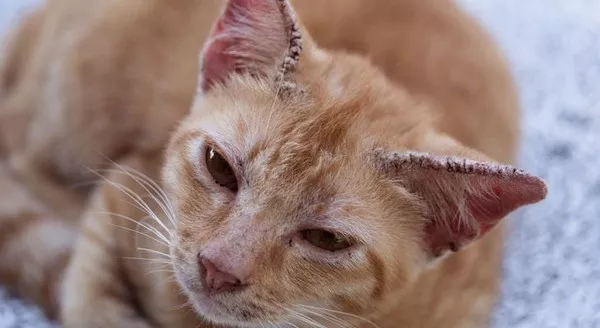Ringworm, despite its name, is not caused by worms but rather a fungal infection that affects the skin, hair, and sometimes nails of animals and humans. While it’s often considered a minor ailment in healthy adults, the same cannot be said for vulnerable populations, such as kittens. In young felines, ringworm can pose serious health risks, potentially leading to fatalities if left untreated. Understanding the dynamics of ringworm in kittens is crucial for effective prevention and treatment strategies.
Understanding Ringworm:
Before delving into the potential lethality of ringworm in kittens, it’s essential to grasp the basics of this fungal infection. Ringworm is caused by various species of fungi known as dermatophytes. These fungi thrive in warm, moist environments and are highly contagious.
Ringworm typically presents as circular, red, scaly patches on the skin, often with hair loss in affected areas. Kittens, with their still-developing immune systems, are particularly susceptible to ringworm infections. Their playful and exploratory nature puts them at higher risk of exposure, especially in environments where multiple animals are present.
The Lethality Risk:
While ringworm itself is not typically fatal in healthy adult animals, its impact can be far more severe in kittens. The primary concern with ringworm in young felines is not the infection itself but the potential complications that may arise if left untreated.
One of the most significant risks associated with ringworm in kittens is the development of secondary bacterial infections. The lesions caused by ringworm create an entry point for bacteria, leading to conditions such as cellulitis or abscesses. These secondary infections can quickly escalate, causing systemic illness and, in severe cases, septicemia.
Additionally, ringworm can compromise a kitten’s overall health and well-being. The constant itching and discomfort associated with the infection can lead to reduced appetite, weight loss, and lethargy. In young animals, these symptoms can quickly progress, resulting in dehydration and weakness.
Furthermore, ringworm is highly contagious, posing a risk not only to the infected kitten but also to other animals and humans in the household. Without prompt intervention and proper hygiene measures, the infection can spread rapidly, creating a cycle of illness and transmission.
Prevention and Treatment:
Preventing ringworm in kittens involves a multi-faceted approach aimed at minimizing exposure and bolstering the kitten’s immune response. Here are some key preventive measures:
1. Quarantine: Upon acquiring a new kitten, especially from a shelter or multi-animal environment, it’s essential to quarantine them from other pets until they’ve been examined by a veterinarian and cleared of ringworm and other contagious diseases.
2. Hygiene: Regular grooming and cleaning of living areas can help reduce the risk of ringworm transmission. Thoroughly disinfecting bedding, toys, and other shared items can prevent the spread of fungal spores.
3. Nutrition: Providing a balanced diet rich in essential nutrients can strengthen a kitten’s immune system, making them less susceptible to infections like ringworm.
4. Veterinary Care: Regular veterinary check-ups are crucial for monitoring a kitten’s health and addressing any potential issues, including ringworm, in its early stages.
5. Isolation of Infected Animals: If a kitten is diagnosed with ringworm, isolating them from other pets is essential to prevent further spread. Additionally, following the veterinarian’s treatment plan, which may include antifungal medications and topical treatments, is vital for clearing the infection.
In cases where ringworm has already progressed to a severe stage, intensive medical intervention may be necessary. This can include oral antifungal medications, medicated baths, and supportive care to address any secondary infections or complications.
Conclusion
While ringworm may not directly cause fatalities in kittens, the potential complications and impact on their overall health should not be underestimated. Timely diagnosis and appropriate treatment are paramount in preventing serious illness and reducing the risk of transmission to other animals and humans. By understanding the risks associated with ringworm in kittens and implementing effective preventive measures, pet owners can ensure the health and well-being of their furry companions.























